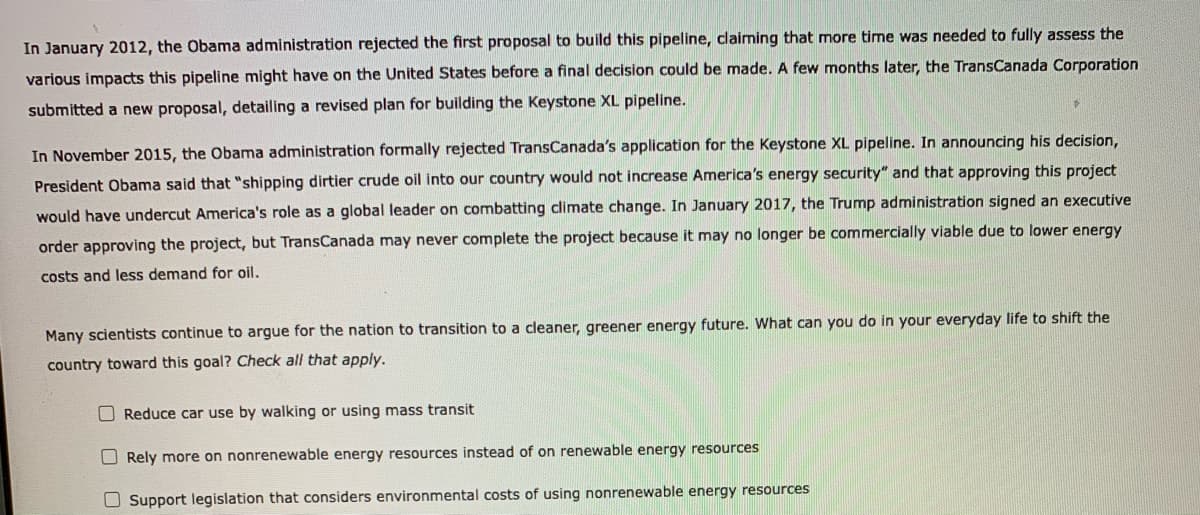In January 2012, the Obama administration rejected the first proposal to build this pipeline, claiming that more time was needed to fully assess the various impacts this pipeline might have on the United States before a final decision could be made. A few months later, the TransCanada Corporation submitted a new proposal, detailing a revised plan for building the Keystone XL pipeline. In November 2015, the Obama administration formally rejected TransCanada's application for the Keystone XL pipeline. In announcing his decision, President Obama said that "shipping dirtier crude oil into our country would not increase America's energy security" and that approving this project would have undercut America's role as a global leader on combatting climate change. In January 2017, the Trump administration signed an executive order approving the project, but TransCanada may never complete the project because it may no longer be commercially viable due to lower energy costs and less demand for oil. Many scientists continue to argue for the nation to transition to a cleaner, greener energy future. What can you do in your everyday life to shift the country toward this goal? Check all that apply. O Reduce car use by walking or using mass transit O Rely more on nonrenewable energy resources instead of on renewable energy resources O Support legislation that considers environmental costs of using nonrenewable energy resources
In January 2012, the Obama administration rejected the first proposal to build this pipeline, claiming that more time was needed to fully assess the various impacts this pipeline might have on the United States before a final decision could be made. A few months later, the TransCanada Corporation submitted a new proposal, detailing a revised plan for building the Keystone XL pipeline. In November 2015, the Obama administration formally rejected TransCanada's application for the Keystone XL pipeline. In announcing his decision, President Obama said that "shipping dirtier crude oil into our country would not increase America's energy security" and that approving this project would have undercut America's role as a global leader on combatting climate change. In January 2017, the Trump administration signed an executive order approving the project, but TransCanada may never complete the project because it may no longer be commercially viable due to lower energy costs and less demand for oil. Many scientists continue to argue for the nation to transition to a cleaner, greener energy future. What can you do in your everyday life to shift the country toward this goal? Check all that apply. O Reduce car use by walking or using mass transit O Rely more on nonrenewable energy resources instead of on renewable energy resources O Support legislation that considers environmental costs of using nonrenewable energy resources
Chapter1: Making Economics Decisions
Section: Chapter Questions
Problem 1QTC
Related questions
Question

Transcribed Image Text:In January 2012, the Obama administration rejected the first proposal to build this pipeline, claiming that more time was needed to fully assess the
various impacts this pipeline might have on the United States before a final decision could be made. A few months later, the TransCanada Corporation
submitted a new proposal, detailing a revised plan for building the Keystone XL pipeline.
In November 2015, the Obama administration formally rejected TransCanada's application for the Keystone XL pipeline. In announcing his decision,
President Obama said that "shipping dirtier crude oil into our country would not increase America's energy security" and that approving this project
would have undercut America's role as a global leader on combatting climate change. In January 2017, the Trump administration signed an executive
order approving the project, but TransCanada may never complete the project because it may no longer be commercially viable due to lower energy
costs and less demand for oil.
Many scientists continue to argue for the nation to transition to a cleaner, greener energy future. What can you do in your everyday life to shift the
country toward this goal? Check all that apply.
O Reduce car use by walking or using mass transit
O Rely more on nonrenewable energy resources instead of on renewable energy resources
O Support legislation that considers environmental costs of using nonrenewable energy resources
Expert Solution
This question has been solved!
Explore an expertly crafted, step-by-step solution for a thorough understanding of key concepts.
This is a popular solution!
Trending now
This is a popular solution!
Step by step
Solved in 2 steps with 1 images

Knowledge Booster
Learn more about
Need a deep-dive on the concept behind this application? Look no further. Learn more about this topic, economics and related others by exploring similar questions and additional content below.Recommended textbooks for you


Principles of Economics (12th Edition)
Economics
ISBN:
9780134078779
Author:
Karl E. Case, Ray C. Fair, Sharon E. Oster
Publisher:
PEARSON

Engineering Economy (17th Edition)
Economics
ISBN:
9780134870069
Author:
William G. Sullivan, Elin M. Wicks, C. Patrick Koelling
Publisher:
PEARSON


Principles of Economics (12th Edition)
Economics
ISBN:
9780134078779
Author:
Karl E. Case, Ray C. Fair, Sharon E. Oster
Publisher:
PEARSON

Engineering Economy (17th Edition)
Economics
ISBN:
9780134870069
Author:
William G. Sullivan, Elin M. Wicks, C. Patrick Koelling
Publisher:
PEARSON

Principles of Economics (MindTap Course List)
Economics
ISBN:
9781305585126
Author:
N. Gregory Mankiw
Publisher:
Cengage Learning

Managerial Economics: A Problem Solving Approach
Economics
ISBN:
9781337106665
Author:
Luke M. Froeb, Brian T. McCann, Michael R. Ward, Mike Shor
Publisher:
Cengage Learning

Managerial Economics & Business Strategy (Mcgraw-…
Economics
ISBN:
9781259290619
Author:
Michael Baye, Jeff Prince
Publisher:
McGraw-Hill Education